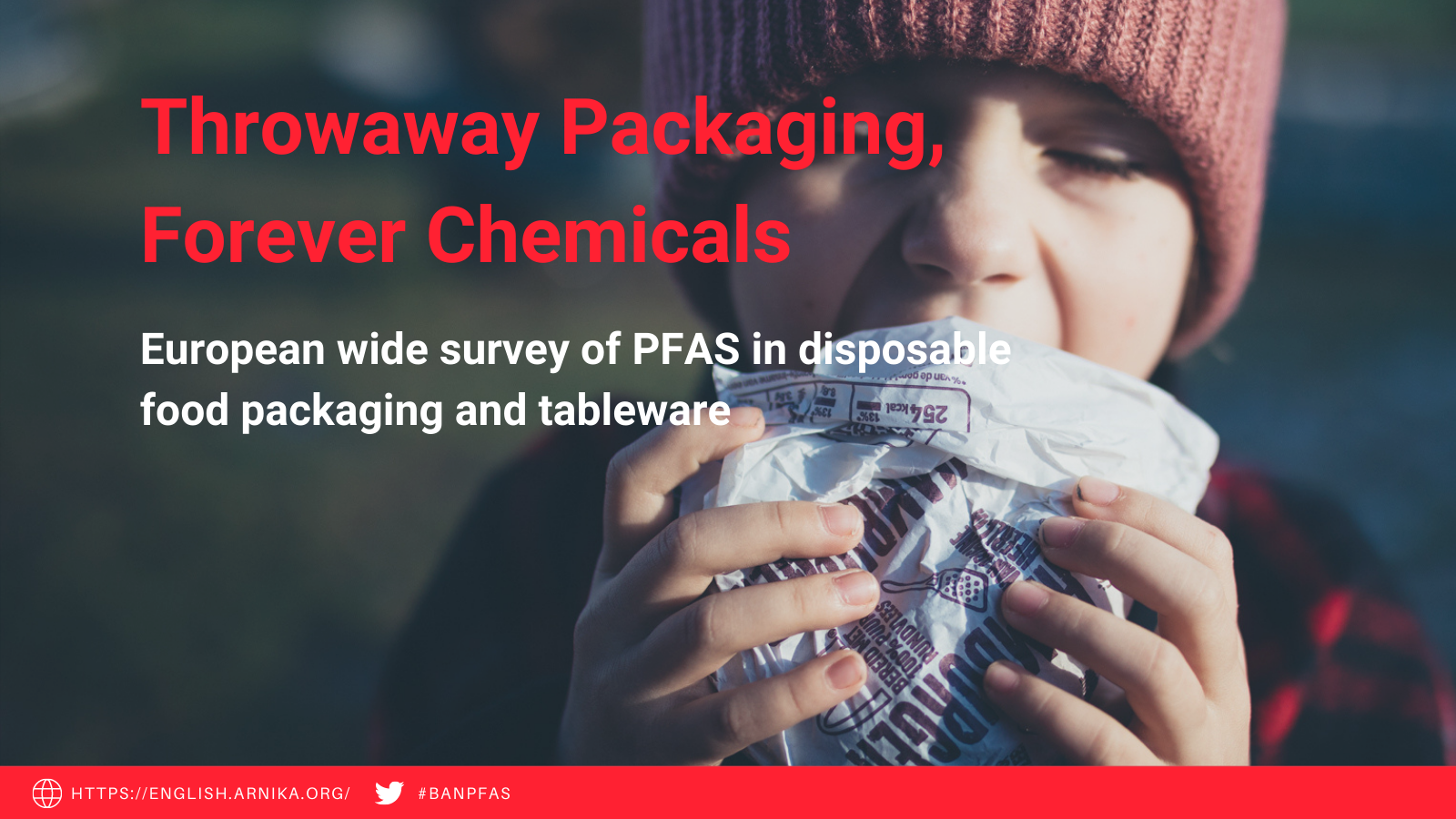We’re thrilled to have Anabel Bennett of environmental charity CHEM Trust present a new investigation ‘Analysis of PFAS chemicals in takeaway food packaging from UK high street retailers’.
Read on to find out what the report shows and what ChemTrust are doing to tackle this ongoing source of PFAS pollution.
Today, CHEM trust and seven other not for profit organisations have published a new scientific investigation showing that harmful, persistent PFAS chemicals are used in disposable take-away food packaging in the UK and across Europe. These results show that PFAS continues to be widely used in UK takeaway food packaging, with little change since 2019, when Fidra tested packaging in a similar study.
The food packaging items from the UK investigated during this study included cookie and pastry bags from popular fast food chains and takeaway restaurants McDonald’s, Gregg’s, Pret-a-Manger, and Subway, and the high street supermarket Co-op. Three pizza boxes from Papa John’s, Domino’s and Pizza Hut were also investigated. These samples were analysed by scientists in independent laboratories in Denmark and the Czech Republic.
All samples of food packaging items analysed in the course of this study had measurable levels of PFAS chemicals, including items that had not been intentionally treated with PFAS. This is similar to the findings from Fidra in 2020, where PFAS were present in 95% of the samples tested as reported by Fidra’s study.
The use of PFAS in disposable food packaging is unacceptable

- PFAS, the ‘forever chemicals’, are the most persistent synthetic chemicals known to date. PFAS pollution generated by their use in high turnover, single use items will last for generations, impacting both people and wildlife.
- Scientific studies have associated exposure to a number of PFAS with severe adverse health effects, including cancer, and impacts on the immune, reproductive and hormone systems.
- Some PFAS can migrate from the packaging into the food, adding to the overall PFAS exposure of the general population from other sources such as drinking water.
Retailers’ actions to remove PFAS from their packaging
In a recent survey commissioned by CHEM Trust, 81% of people in the UK said that they would stop buying a product (e.g. specific cosmetics, cookware, furniture, clothing etc.) if they found out that by using the product they would be exposed to harmful chemicals.
78% said they would stop buying a product if they found out that by using it or disposing of it, wildlife would be exposed to harmful chemicals.
In the context of this study, CHEM trust contacted all of the companies whose packaging was tested to share the results and ask what steps they are taking to remove PFAS from their packaging. We received responses from McDonald’s, who reaffirmed their commitment to remove PFAS from all their customer products globally by 2025, and from the Co-op, who have been engaging with Fidra since its 2020 study.
Cathryn Higgs, Head of Policy at Co-op said: ‘Co-op is committed to designing own-brand products with quality, sustainability and health in front of mind, ensuring our packaging is created in a responsible way. We are actively working on how to remove PFAS from the very small number of own-brand products affected.”
Dr Kerry Dinsmore, Projects Manager and PFAS lead at Fidra says: ‘Almost 12,000 people signed Fidra’s recent petition asking UK supermarkets to remove PFAS from their food packaging and it’s brilliant to see Co-op listening to their customers and taking action to remove these harmful chemicals. This is a great example for others to follow, and a clear indication to policy-makers that a ban on PFAS in UK food packaging is both necessary and feasible, right now’
CHEM Trust’s view – time for the UK government to act
These commitments by UK retailers are a positive step forward, however CHEM Trust’s view is that legal action is needed to ensure that harmful chemicals are not present in consumer products, including food packaging.
Our study shows that in Denmark, where a ban on PFAS in food packaging has been in place since July 2020, french fries bags from McDonald’s are not treated with PFAS chemicals. The same item was bought in the UK at the same time and was found to be treated with PFAS chemicals.
66% of people in the UK think the UK Government should be the one taking action to ensure hazardous chemicals are not present in food packaging.
CHEM Trust is therefore calling on the UK government to phase out all unnecessary uses of PFAS, including in food packaging, and to restrict these substances as a group. In our view, it is the only way to:
- Prevent emissions of all PFAS chemicals.
- Stop the accumulation of these highly persistent chemicals in the environment and our bodies.
- Protect UK citizens and wildlife from exposure to these harmful substances.
Dr Julie Schneider, Campaigner at CHEM Trust and co-author of the study said: “Every year of delay in regulating this group of ‘forever chemicals’ increases the pollution burden for current and future generations of people and wildlife. Some PFAS emitted today could still be present in the environment in several centuries. A ban on all non-essential uses of PFAS chemicals should be urgently implemented.”
Resources from CHEM Trust
- For more information about this study, see the CHEM Trust FAQ.
- CHEM Trust’s UK briefing: CHEM Trust, 2021. Analysis of PFAS chemicals in takeaway food packaging from UK high street retailers. 13p
- Full report of the EU wide survey: Straková, J., Schneider, J., Cingotti, N. et al., 2021. Throwaway Packaging, Forever Chemicals: European wide survey of PFAS in disposable food packaging and tableware. 54p
- Executive summary of the EU wide survey: Straková, J., Schneider, J., Cingotti, N. et al., 2021. Throwaway Packaging, Forever Chemicals: European wide survey of PFAS in disposable food packaging and tableware – Executive summary. 11p
- For more information about PFAS in general, consult the CHEM Trust PFAS Webpage
- Help us take action on hazardous chemicals in food packaging
Dr Kerry Dinsmore, Projects Manager and PFAS lead at Fidra adds:
Whilst we’re disappointed to see PFAS continue to be used in UK food packaging, there has undoubtedly been a shift in recognition since we launched our initial report in early 2020. That a major supermarket such as Co-op is listening and taking action is a brilliant start, but a start is all it should be. This new study highlights the widespread use of PFAS in paper, board and moulded-fibre packaging, the very same packaging often marketed as a sustainable alternative to single-use plastic. The UK Government should now be taking the example set by proactive retailers and putting in place clear legislation that bans the addition of PFAS to any food packaging, including the food to go sector. Failing to take urgent action, right now while the food industry are engaged in packaging reform, risks undermining the environmental benefits of the current plastic-free movement by simply swapping one visible pollutant with a hidden, and more toxic, chemical alternative.
